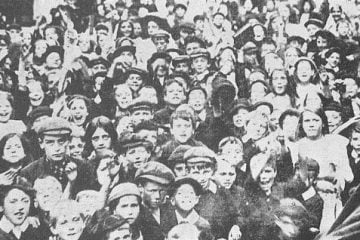An important part of building the Marxist Student Federation is publishing articles, reports and interviews by our members and those who agree with our ideas.
We publish these articles on our website, in our journal and in local Marxist society newsletters. Many of our articles are also reproduced in the pages of Socialist Appeal or on www.socialist.net
The aim of writing articles should be to keep others up to date with events in your local area, to provide a Marxist analysis of national and international events, and to provide education in Marxist theory.
See below for advice on writing reports, interviews, theoretical and agitational articles.
How to write a report
A report needn’t be long, just a couple of hundred words will do, and it should cover the following basic points:
-
What event is the subject of the report? When and where did it take place?
Example:
“A meeting on the current crisis in Venezuela was hosted in Kings’ College, Cambridge by the Cambridge Marxist Society on 15th February”
“UCU picket lines were in place at all entrances to the Queen Mary, University of London campus this morning (26th March)”
-
Give some details about the event
Example:
“The meeting was attended by 30 people and John Smith from the Hands off Venezuela campaign led the excellent discussion which lasted for two hours”
“Roughly 50 staff were on the picket lines and were joined by around 20 students, including 5 representatives from the Queen Mary Marxist society who brought sandwiches for the striking workers and handed out leaflets”
-
Explain the politics of the event
Example:
“The discussion focussed on the reactionary nature of the protests against Maduro and it was generally agreed that the way forward for the Bolivarian revolution is via a clear socialist programme that makes no concessions to the capitalist counter-revolution”
“Staff were on strike in response to a proposed pay rise of just 1% which would, in effect, be a pay cut. This is yet another attack on working people who are being asked to pay for a crisis of capitalism that they did not cause”
-
Describe the mood of people at the event
Example:
“People were pleased that the discussion focussed on such a vital and pressing issue and there was a lot of enthusiasm for helping the Hands off Venezuela campaign as much as possible”
“Many staff had high spirits and recognised that this was simply the first step of many in the fight for decent wages and conditions. A number of staff also agreed with the Marxists who spoke about the need for a political, socialist struggle to guarantee victory”
-
Conclude by drawing any lessons from the event that might be relevant to other readers
Example:
“Clearly there is a lot of interest and an appetite to defend the Bolivarian revolution among students. This is something that the Marxist Student Federation nationally and our Marxist society locally can and will continue to do.”
“Evidently staff are willing to fight for their rights and they need union leaders who are willing to pursue that fight. It is the role of students in the Marxist societies and through the student union to support our staff in this struggle”
How to interview someone and how to write it up
Interviews are a good way to make contacts with other people in the student and labour movement. They should be fairly short and the questions should be fairly broad and open. Remember the following points:
-
Record the interview on your mobile phone or some other device. If that is not possible then take notes with a pen and paper.
-
Check with the interviewee that they are happy to be interviewed for the Marxist Student Federation’s publications and that it will be OK to publish their real name and their position in the student or labour movement. If the latter is not possible, ask if they would be happy for us to publish it under a pseudonym.
-
Ask for their political views on the topic
Example:
“Why are you supporting the Hands off Venezuela campaign and the Bolivarian revolution?”
“Why have you decided to take strike action today?”
-
Ask them how they would like to see things develop in the future
Example:
“What do you think the student union will be doing to support this campaign? What role do you think the Marxist society has to play in this campaign?”
“Would you be willing to take further action in defence of pay and conditions? Do you think further action is likely? How do you see this struggle being resolved?”
-
Finally, put the Marxist position to them and ask what they think of it
Example:
“Personally I believe that the Marxist society must argue within the student union in favour of calling a demonstration on this issue, and that it must argue more broadly for socialist policies to be adopted both in Britain and internationally as the best way to defend the Bolivarian revolution. What are your thoughts on that?”
“My understanding is that staff are ready and willing to fight management all the way on this, but the union leaders are hesitant because they have no alternative to austerity. I see the only alternative as the expropriation of the largest banks and businesses and placing them under the democratic control of the working class. This is what union leaders need to fight for. Would you agree with that?”
These are clearly very basic interview questions and the circumstances will dictate the most appropriate questions. You should have a few questions prepared but try to go with the flow of the interview rather than rigidly sticking to a script.
When writing the interview up be as faithful as possible to what the interviewee says without inhibiting the smooth flow of the text. If certain questions are irrelevant then don’t include them for the sake of it. Even if the political ideas of the interviewee are not Marxist we may still publish the interview with a short comment explaining that, while this is not the position of the Marxist Student Federation, it is nevertheless an interesting account from a figure in the movement.
How to write a theoretical article
Theoretical articles tend to be longer and more detailed than agitational pieces. They can cover all aspects of Marxist theory from a variety of angles, one possibility for students is to write an article on the Marxist perspective of the subject that they’re studying. Remember these basic points:
-
Choose an appropriate topic
This should be something that interests you and that you are willing and able to research in some detail.
-
Research the topic
Theoretical articles are not based on abstract ideas but on facts, figures and arguments. Make sure you have as many relevant statistics, facts and evidence to demonstrate a detailed knowledge of the subject of the article
-
Research any relevant Marxist texts on the topic
While there may not have been anything written by a Marxist on the exact topic as you are considering, there is likely to be material in the form of books, pamphlets, articles, audio and video recordings that could help to formulate your position on the topic in question. Also speak to other members of your Marxist society to get their ideas about the topic.
-
Write clearly and in plain language as far as possible
Avoid using technical terminology in favour of explaining concepts clearly in your own words. This may not always be possible, but where it is not you should be careful to define the terms that you are using. Avoid quoting long passages from other texts in favour of paraphrasing an idea using your own words.
How to write an agitational article
Agitational articles are typically those that provide a Marxist comment on current events. They do not have to be very long but should contain enough material to clearly explain the Marxist position in relation to the subject.
Below is a guide written by the Militant Tendency in 1971 that provides some guidance relating to agitational articles.
-
State briefly, in clear simple language and as vividly as possible, the most important or spectacular fact in the matter being reported.
Example:
“Tear gas was used by police last Tuesday to disperse a demonstration of strikers in Hong Kong”
“Two hundred porters have defied the orders of officials of the Railwayman’s Union in coming out on strike at Paddington Station on February 3rd”
-
Make a brief comment on the facts to make it clear which side we are taking and to strike the keynote of the report.
Example:
“British ‘democracy’ is teaching the workers in Hong Kong that thy have nothing to choose between its methods and those of fascism”
“The Trade Union officials, slow to take action in demanding the redressing of the porter grievance, are quick in coming to the aid of the bosses to break their strike”
-
Outline the background of events
Example:
“The Chinese workers are mainly engaged in light industry and transport, on average receiving a meagre wage”
“The poor conditions of the porters, their wages etc.”
-
Outline the events which led up to the present position
Example:
“The strike of 2,000 transport and dockworkers last November was supported by the entire working population, who actively aided…etc.
“For months the porters have pressed for the consideration of their cause. Last June representations were…”
-
Give the details of the matter being reported
Example:
“The demonstration of strikers on Sunday was a peaceful one. They assembled at the Market Square at 2pm. After the speeches by the union leaders they formed up… etc.”
“Their final ultimatum ignored, the strike was to commence on Monday morning. The chairman of the strike committee…”
-
Make a detailed commentary or criticism
Example:
“The brutal provocation of the police…etc.”
“The attitude of certain stewards in supporting the…”
-
Draw the lessons and state our policy
Example:
“British workers must protest against the use of tear gas in crushing the colonial workers. Only by linking our struggle with…etc.”
“The militants within the NUR must continue their struggle against the attempts of the present leadership…etc.”
-
Summarise the lessons and our policy, where possible in concise slogans, to end the article.



